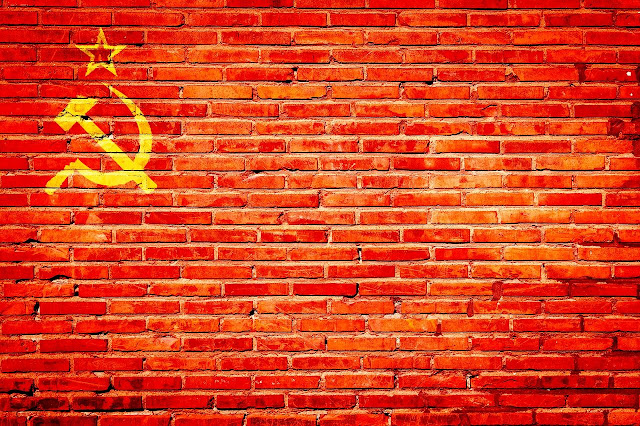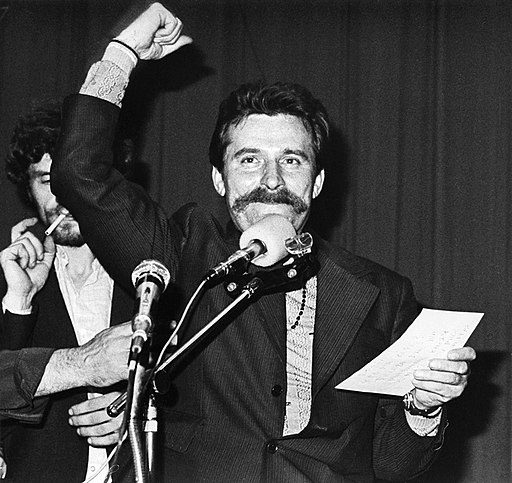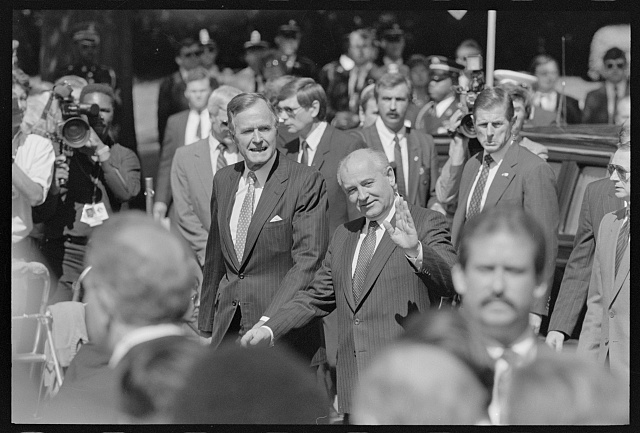The centrally controlled economy threatened to collapse, and the member states of the Union of Soviet Republics (USSR) demanded more independence and demanded an opening to the West.
"Solidarność" union
In the 1980s, protests against the economic situation and the dictatorship of the Communist Party increased in the states of the Eastern Bloc.
In Poland, the Solidarność union (Polish for “solidarity” full name - Independent Self-Governing Trade Union "Solidarity") was formed at the Lenin Shipyard in Gdańsk, Poland. It was the first independent trade union in a Warsaw Pact country to be recognized by the state, and its leader was Lech Wałęsa, awarded with Nobel Peace Prize in 1983.
Lech Wałęsa, August 1980
Solidarność was banned in 1981, but continued to exist underground and campaigned for social rights, democracy, and freedom of expression. It is widely recognized as having played a central role at the end of Communist rule in Poland.
Mikhail Sergeyevich Gorbachev, (born March 2, 1931), Soviet official, general secretary of the Communist Party of the Soviet Union (CPSU) from 1985 to 1991, and president of the Soviet Union in 1990–91
With the election of Mikhail Sergeyevich Gorbachev as General Secretary of the Communist Party of the Soviet Union (CPSU) in 1985, the policy of the Soviet Union changed. He proclaimed a "new way of thinking" that would henceforth dominate Soviet foreign policy. Since April 1986, in several public speeches, he has granted every socialist country the freedom to "go its own way". This abandonment of the Brezhnev Doctrine is generally considered to be the beginning of the end of the Eastern Bloc. Gorbachev recognized the economic and political weaknesses of the communist system and tried to save it through reforms. The two most important were perestroika and glasnost.
Perestroika (Russian for “restructuring”) describes the economic and political change within the USSR towards more freedom and democracy.
Perestroika program aimed to restructure Soviet economic and political policy. The communist central economy was loosened and elements of the free-market competition were allowed. The Soviet Union took up more economic ties with the West. In 1989 the first free elections were held in the Soviet Union.
Glasnost, (Russian for “openness”) was a Soviet policy of open discussion of political and social issues.
The Soviet government tried to make political decisions more transparent and allowed its citizens more freedom of expression and freedom of the press.
In 1987, Mikhail Gorbachev and US President Ronald Reagan signed a treaty to disarm certain nuclear weapons. This was an important step in defusing the Cold War. In 1989 Gorbachev proclaimed freedom of religion for all Soviet citizens and granted the Eastern Bloc states more political independence.
In the Warsaw Pact states, the previously brutally suppressed protest movements were now gaining massive support, and at the end of 1989 the protests in the capitals and provinces of the Eastern bloc intensified to such an extent that the communist governments were overthrown everywhere.
In October 1989 the Republic of Hungary was proclaimed.
Fall of the Berlin Wall
The fall of the Berlin Wall on 9 November 1989 was a pivotal event in world history that marked the fall of the Iron Curtain and the start of the fall of communism in Eastern and Central Europe. From September 1989, so-called Monday demonstrations took place in Leipzig and other East German cities, in which tens of thousands of people took part.
In a peaceful revolution, the SED regime (Socialist Unity Party of Germany) was overthrown and a parliamentary democracy was established. On the night of November 10th, all border posts within Berlin were opened. Crowds climbed the wall and occupied it. In the days that followed, all border crossings in the GDR were opened for free travel. The demolition of the Berlin Wall began.
The end of the Eastern Bloc and the Soviet Union (USSR)
The opening of the Iron Curtain accelerated the collapse of the Eastern Bloc. In the states of the Eastern Bloc, political and economic upheavals took place, mostly in a peaceful manner. The states freed themselves from Soviet domination and oriented themselves towards Western models:
On November 17, 1989, only nine days after the fall of the Berlin Wall, students gathered in Prague, Czechoslovakia to protest against the communist regime. In the course of the so-called Velvet Revolution, which was largely peaceful, the Czechoslovak Federal Republic was founded in December 1989.
In December 1989 the Republic of Poland was proclaimed. The first partially free parliamentary elections since 1945 had already been held in June.
In Bulgaria, the head of state and party leader Todor Zhivkov (Bulgarian: Тодор Живков) resigned on November 10, 1989, and Andrey Lukanov (Bulgarian: Андрей Луканов won the elections on February 3, 1990.
In Romania, parliamentary democracy was established after a violent uprising against the communist regime. On December 21, the Romanian secret service "Securitate" attacked a mass demonstration in Bucharest and caused a bloodbath with estimated 689–1,290 dead. In the following days, the dictator Nicolae Ceaușescu was overthrown and after an unsuccessful attempt to escape. He and his wife Elena were shot dead on December 25th, 1989.
On October 3, 1990, the two German states were reunified. This day is celebrated today as the Day of German Unity.
The political changes in the Eastern European states also had an impact on the Soviet Union. The republics of the Soviet Union also demanded their independence. After sometimes violent protests and the August coup in 1991 against the Soviet government, the USSR disintegrated into individual states.
With the Soviet Union in 1991, the Council for Mutual Economic Aid (Economic alliance of the Eastern Bloc countries) and the Warsaw Pact (Military alliance of the Eastern Bloc countries) dissolved.
The last president of the Soviet Union, Mikhail Gorbachev resigned on Christmas Day 1991














